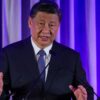Technology
What Trump’s Nvidia and AMD China offer approach for the arena
Nvidia and AMD have assuredly to percentage a few of their earnings from gross sales to China with the U.S. executive, in keeping with a number of reviews, sparking debate about whether or not the walk may affect the chip giants’ industry and whether or not Washington would possibly search out related offers.
In alternate for 15% of revenues from the chip gross sales, the 2 semiconductor corporations will obtain export licenses to promote Nvidia’s H20 and AMD’s MI308 chips in China, in keeping with the Financial Times.
“We follow rules the U.S. government sets for our participation in worldwide markets. While we haven’t shipped H20 to China for months, we hope export control rules will let America compete in China and worldwide,” Nvidia mentioned in a commentary to NBC Information. “America cannot repeat 5G and lose telecommunication leadership. America’s AI tech stack can be the world’s standard if we race.”
CNBC has reached out to AMD and the White Area for remark.
The association crafted through U.S. President Donald Trump’s management is “unusual”, analysts advised CNBC, however underscores the transactional nature of the wave White Area chief. In the meantime, traders see the walk as extensively certain for each Nvidia and AMD, which yet again store get right of entry to to the Chinese language marketplace.
What it approach for Nvidia and AMD
Nvidia’s H20 is a chip that has been in particular created to satisfy export necessities to China. It was once up to now blocked underneath export curbs however the corporate closing day mentioned that it anticipated to obtain licenses to ship the product to China.
Also in July, AMD said that it would resume exports of its MI308 chips.
At the time, there was no suggestion that the resumption of sales to China would come with conditions or any kind of revenue forfeiture, and the step was celebrated by markets because of the billions of dollars worth of potential sales to China that were back on the table.
On Monday, Nvidia and AMD shares traded only slightly lower in premarket trading, highlighting how investors believe the latest development is not a major negative for the companies.
“From an investor perspective, it’s still a net positive, 85% of the revenue is better than zero,” Ben Barringer, global technology analyst at Quilter Cheviot, told CNBC.
“The question will be whether Nvidia and AMD adjust their prices by 15% to account for the levy, but ultimately it’s better that they can sell into the market rather than hand the market over entirely to Huawei.”
Huawei is Nvidia and AMD’s closest Chinese rival.
Uncertainty nevertheless still looms for both U.S. companies over the longer term.
“In the short term, the deal gives both companies some certainties for their exports to China. For the long term, we don’t know if the U.S. government may want to take a bigger cut from their China business especially if their sales to China keep growing,” George Chen, partner and co-chair of the digital practice at The Asia Group, told CNBC.
Trump unlikely to strike similar deals
Multiple analysts told CNBC that the deal is “unusual,” but almost par for the course for Trump.
“It’s a good development, albeit a strange one, and feels like the sort of arrangement you might expect from President Trump, who is a deal-maker at heart. He’s willing to yield, but only if he gets something in return, and this certainly sets an unusual precedent,” Barringer said.
Neil Shah, partner at Counterpoint Research, said the revenue cut is equivalent to an “indirect tariff at source”.
The Futurum Group CEO Daniel Newman also posted on X on Sunday that the walk is a “sort of ‘tax’ for doing business in China.”
However such offers are not going to be short for alternative corporations.
“I don’t anticipate it extending to other sectors that are just as important to the U.S. economy like software and services,” Nick Persistence, observe manage for AI at The Futurum Team, advised CNBC.
The U.S. sees semiconductors as a strategic generation, given they underpin such a lot of alternative equipment like synthetic insigt, client electronics or even army packages. The U.S. has subsequently put chips underneath an export keep an eye on regime not like that of any alternative product.
“Semiconductor is a very unique business and the pay-to-play tactic may work for Nvidia and AMD because it’s very much about getting export approval from the U.S. gov,” The Asia Team’s Chen mentioned.
“Other business like Apple and Meta can be more complicated when it comes to their business models and services for China.”
How China may react
Semiconductors have turn out to be a extremely delicate geopolitical subject. Over the closing two weeks, China has raised considerations in regards to the safety of Nvidia’s chips.
China’s state-run newspaper World Occasions slammed Washington’s ways, mentioning a professional.
“This approach means that the US government has repudiated its original security justification to pressure US chip makers to secure export licenses to China through economic leverage,” the World Occasions article mentioned.
The Chinese language executive is but to remark at the reported earnings assurance.
Trump’s offer with Nvidia and AMD will most likely stir blended emotions in China. At the one hand, China can be unsatisfied with the association. At the alternative hand, Chinese language corporations will most likely need to get their fingers on those chips to bring to proceed to journey their very own AI functions.
“For China, it is a conundrum as they need those chips to advance their AI ambitions but also the fee to the US government could make it costlier and there is a doubt of US “backdoors” considering US has agreed for chipmakers to supply,” Counterpoint Analysis’s Shah mentioned.
— CNBC’s Erin Doherty contributed to this file.





